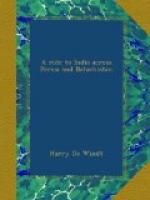I accepted a kind and courteous invitation from Mr. L——, of the Indo-European Telegraph, with pleasure, for the Dak bungalow was dirty and comfortless. Although my host and charming hostess would have made any place agreeable, Quetta is, from everything but a strategical point of view, dull and uninteresting. It is an English garrison town, and all is said. The usual nucleus of scandal, surrounded by dances, theatricals, polo, flirtation, drink, and—divorce. Are they not all alike from Gibraltar to Hong Kong?
Under the guidance of my host, however, a pleasant trip was made to the Khojak tunnel. When one considers the comparatively short time it has been in hand, it is almost incredible that, with so many difficulties (water, hard rock, etc.), this work should have progressed as it has. The tunnel, which runs due east and west, is, or will be, two miles and a half in length and three hundred and sixty-five feet in depth at the deepest part from the earth’s surface. From the eastern end only sixty-five miles over a firm and level plain separates it from Kandahar. Even when I was there, [D] a light line could have been laid to that city in six weeks without difficulty. The plant, rails, and sleepers were on the spot, having been carried over the hill, and a railway-carriage could then run from Calcutta to the eastern extremity of the tunnel without break of gauge. The tunnel, when completed, will be thirty-four feet broad, and twenty-five feet in height.
A curious incident happened at one of the railway-stations between Quetta and Karachi. At the buffet of the one in question, I found Gerome conversing volubly in Russian with a total stranger, a native. On inquiry I found he was a very old friend, a Russian subject and native of Samarcand. “He has just come through from Cabul,” said my companion. “He often does this journey”—ostensibly for purposes of trade.




